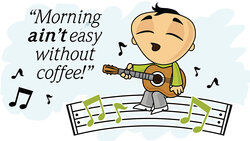
Have you been told your entire life you shouldn't use 'ain't'? You might now be questioning if ain't is even a word. To clear up that confusion, you can look at the word ain't, its meaning, and how it is used in informal English. And just so you know, ain't is a word.
Is Ain't a Word?
When it comes to controversial words, ain't takes the cake. Ain't is actually a real word. However, it is one many wordsmiths might frown upon. In the world of linguistics, ain't is what is known as a slang contraction. So, it's a contraction that is used in conversational, spoken English, but it's one that might get you a few negative looks from your English teacher.
Since you know ain't is, in fact, a word, check out what it means in informal English and how it is used. In the famous words of Bachman Turner Overdrive, "You ain't seen nothing yet!"
When You Can Use Ain't
You ain't just going to pull out the word ain't for your writing project. That would definitely get red marks on your paper. So, when can you use ain't? Typically, ain't is used in informal spoken English. While that is the general rule, it can also be used in dialogue or to add a specific tone to a novel. It's also found in informal works such as songs, movies, and poetry.
The word ain't shouldn't be used in business, scholarly, or formal writing. Make sure to really think about it before adding it to any type of professional work.
How to Use Ain't
Now that you know the when, it's time to look at the how. Ain't is always used as a negative sentence and can mean:
- Am not
- Is not
- Has not
- Have not
That just ain't right, now, is it? And somewhere, an English teacher is cringing.
Examples of Using Ain't
Explanations are delightful, but examples are better. View the word ain't in action.
- I ain't going to eat those peas.
I am not going to eat those peas.
- I ain't going with you.
I am not going with you.
- That ain't what you told me.
That is not what you told me.
- It ain't as bad as you think.
It is not as bad as you think.
- He ain't shown up in days.
He has not shown up in days.
- She ain't gone to school
She has not gone to school.
- We ain't seen them.
We have not seen them.
- They ain't been here.
They have not been here.
Some English dialects also use ain't for the verb do. This might look like:
- He ain't got a bike.
He does not have a bike.
Where Ain't Came From
When it comes to slang words, ain't is an oldy. Typically, ain't is a common contraction for 'am not' since this doesn't have a formal contraction. However, if it followed the normal contraction rules, the contraction for 'am not' would be 'amn't'. So why isn't it?
In a wide swath of English dialects, it is. This word is common in Scotland and Ireland, "I amn't sure what he said," and, "I am going, amn't I?" are common in those variants of English. However, American English doesn't like two nasal consonants like 'm' and 'n' together. So, in most dialects, they merged into an't, the spelling of which eventually evolved into ain't.
These rather pertinent facts of the English language were overlooked by the prescriptive grammarians who have all these years attempted to totally obliterate amn't and ain't from the English vocabulary.
Ain't Is a Word
You know that ain't is a word. But, don't go and try to impress your teacher or your boss with this nugget of knowledge first thing tomorrow morning. We all have to coordinate the restitution of ain't to its rightful position in the language. That isn't likely to happen by daybreak, but it is time to start thinking about it. Since the ain't question has been all cleared up, you might look at 7 grammar rules that you can break. It's anarchy, ain't it?